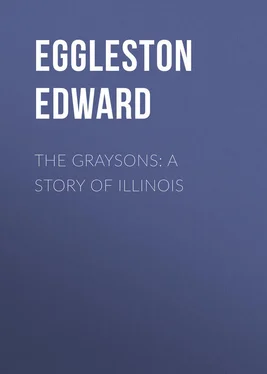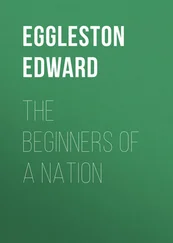Edward Eggleston - The Graysons - A Story of Illinois
Здесь есть возможность читать онлайн «Edward Eggleston - The Graysons - A Story of Illinois» — ознакомительный отрывок электронной книги совершенно бесплатно, а после прочтения отрывка купить полную версию. В некоторых случаях можно слушать аудио, скачать через торрент в формате fb2 и присутствует краткое содержание. Жанр: История, foreign_antique, foreign_prose, на английском языке. Описание произведения, (предисловие) а так же отзывы посетителей доступны на портале библиотеки ЛибКат.
- Название:The Graysons: A Story of Illinois
- Автор:
- Жанр:
- Год:неизвестен
- ISBN:нет данных
- Рейтинг книги:4 / 5. Голосов: 1
-
Избранное:Добавить в избранное
- Отзывы:
-
Ваша оценка:
- 80
- 1
- 2
- 3
- 4
- 5
The Graysons: A Story of Illinois: краткое содержание, описание и аннотация
Предлагаем к чтению аннотацию, описание, краткое содержание или предисловие (зависит от того, что написал сам автор книги «The Graysons: A Story of Illinois»). Если вы не нашли необходимую информацию о книге — напишите в комментариях, мы постараемся отыскать её.
The Graysons: A Story of Illinois — читать онлайн ознакомительный отрывок
Ниже представлен текст книги, разбитый по страницам. Система сохранения места последней прочитанной страницы, позволяет с удобством читать онлайн бесплатно книгу «The Graysons: A Story of Illinois», без необходимости каждый раз заново искать на чём Вы остановились. Поставьте закладку, и сможете в любой момент перейти на страницу, на которой закончили чтение.
Интервал:
Закладка:
Edward Eggleston
The Graysons: A Story of Illinois
PREFACE
I had thought to close up the cycle of my stories of life in the Mississippi Valley with "Roxy" which was published in 1878. But when I undertook by request of the editor to write a short story for "The Century Magazine," and to found it on a legendary account of one of President Lincoln's trials, the theme grew on my hands until the present novel was the result. It was written mostly at Nervi, near Genoa, where I could not by any possibility have verified the story I had received about 1867 from one of Lincoln's old neighbors. To have investigated the accuracy of my version of the anecdote would have been, indeed, to fly in the face and eyes of providence, for popular tradition is itself an artist rough-hewing a story to the novelist's hands. During the appearance of this novel in serial form I have received many letters from persons acquainted in one way or another with the actors and sufferers in the events, of which these here related are the ideal counterparts. Some of these letters contain information or relate incidents of so much interest that I have it in mind to insert them in an appendix to some later edition of this book.
EDWARD EGGLESTON.
Joshua's Rock, Lake George, 1888.
This Book is respectfully inscribed to the Hon. Jonathan Chace, United States Senator from Rhode Island; the Hon. Joseph Hawley, United States Senator from Connecticut; the Hon. W. C. P. Breckenridge, Representative from Kentucky; and the Hon. Patrick A. Collins, Representative from Massachusetts, who have recently introduced or had charge of International Copyright Bills, and to those Members of both Houses of Congress who have coöperated with them in the effort to put down literary buccaneering.
E. E.
I
TURNING THE BIBLE
The place of the beginning of this story was a country neighborhood on a shore, if one may call it so, that divided a forest and prairie in Central Illinois. The date was nearly a lifetime ago. An orange-colored sun going down behind the thrifty orchard of young apple-trees on John Albaugh's farm, put into shadow the front of a dwelling which had stood in wind and weather long enough to have lost the raw look of newness, and to have its tints so softened that it had become a part of the circumjacent landscape. The phebe-bird, locally known as the pewee, had just finished calling from the top of the large barn, and a belated harvest-fly, or singing locust, as the people call him, was yet filling the warm air with the most summery of all summery notes – notes that seem to be felt as well as heard, pushing one another faster and yet faster through the quivering atmosphere, and then dying away by degrees into languishing, long-drawn, and at last barely audible vibrations.
Rachel, the daughter of the prosperous owner of the farm, was tying some jasmine vines to the upright posts that supported the roof of a porch, or veranda, which stretched along the entire front of the house. She wore a fresh calico gown, and she had something the air of one expecting the arrival of guests. She almost always expected company in the evening of a fine day. For the young person whose fortune it is to be by long odds the finest-looking woman in a new country where young men abound, and where women are appreciated at a rate proportioned to their scarcity, knows what it is to be a "reigning belle" indeed. In the vigorous phrase of the country, Rachel was described as "real knock-down handsome"; and, tried by severer standards than those of Illinois, her beauty would have been beyond question. She had the three essentials: eyes that were large and lustrous, a complexion rich and fresh, yet delicately tinted, and features well-balanced and harmonious. Her blonde hair was abundant, and, like everything about her, vital. Her hands and feet were not over-large, and, fortunately, they were not disproportionately small; but just the hands and feet of a well-developed country girl used to activity and the open air. Without being more than ordinarily clever, she had a certain passive intelligence. Her voice was not a fine one, nor had her manners any particular charm except that which comes from the repose of one who understands that she is at her best when silent, and who feels herself easily ahead of rivals without making any exertion. Hers was one of those faces the sight of which quickens the pulses even of an old man, and attracts young men with a fascination as irresistible as it is beyond analysis or description. Many young men were visitors at John Albaugh's hospitable house, and where the young men came the young women were prone to come, and thus Albaugh's became a place of frequent and spontaneous resort for the young people from all the country round.
But it had happened with this much-courted girl, as it has happened to many another like her, that with all the world to choose from, she had tarried single longer than her companions. Rachel was now past twenty-three, in a land where a woman was accounted something of an old maid if unmarried at twenty. Beauties such as she find a certain pleasure in playing with their destiny, as pussy loves the excitement of trifling with the mouse that can hardly escape her in any way. Prey that comes too easily in reach is not highly valued. Every bid for such a woman's hand leads her to raise her estimation of her own value. Rachel's lovers came and went, and married themselves to young women without beauty. Lately, however, Rachel Albaugh's neighbors began to think that she had at length fallen in love "for keeps," as the country phrase expressed it.
"I say, Rache," called her brother Ike, a youth of fifteen, who was just then half-hidden in the boughs of the summer apple-tree by the garden gate, "they's somebody coming."
"Who is it, Ike?"
"Henry Miller and the two Miller girls."
"Oh! is that all?" said Rachel, in a teasing tone.
"Is that all ?" said Ike. "You don't care for anybody but Tom Grayson these days. I'll bet you Tom'll be here to-night."
"What makes you think so?" asked Rachel, trying not to evince any interest in the information.
"Don't you wish you knew?" he answered, glad to repay her teasing in kind.
"Did you see him to-day?"
"Say, Sis," said Ike, affecting to dismiss the subject, "here's an awful nice apple. Can you ketch?"
Rachel held up her hands to catch the apple, baring her pretty arms by the falling back of her loose sleeves. The mischievous Ike threw a swift ball, and Rachel, holding her hands for it, could not help shrinking as the apple came flying at her. She shut her eyes and ducked her head, and of course the apple went past her, bowling away along the porch and off the other end of it into the grass.
"That's just like a girl," said Ike. "Here's a better apple. I won't throw so hard this time." And Rachel caught the large striped apple in her two hands.
"I say, Ike," she said, coaxingly, "where did you see Tom?"
"Oh! I met him over on the big road as I went to mill this morning; he was going home to his mother's, an' he said he was coming over to see you to-night. An' I told him to fetch Barbara, so 's I'd have somebody to talk to, 'cause you wouldn't let me get a word in ageways with him. An' Tom laughed an' looked tickled."
"I guess you won't talk much to Barbara while Ginnie Miller's here," Rachel said; and by this time Henry Miller and his two sisters were nearing the white gate which stood forty feet away from the cool front porch of the house.
"Howdy, Rachel!" said Henry Miller, as he reached the gate, and "Howdy! Howdy!" came from the two sisters, to which Rachel answered with a cordial "Howdy! Come in!" meant for the three. When they reached the porch, she led the way through the open front door to the "settin' room" of the house, as the living-room was always called in that day.
Читать дальшеИнтервал:
Закладка:
Похожие книги на «The Graysons: A Story of Illinois»
Представляем Вашему вниманию похожие книги на «The Graysons: A Story of Illinois» списком для выбора. Мы отобрали схожую по названию и смыслу литературу в надежде предоставить читателям больше вариантов отыскать новые, интересные, ещё непрочитанные произведения.
Обсуждение, отзывы о книге «The Graysons: A Story of Illinois» и просто собственные мнения читателей. Оставьте ваши комментарии, напишите, что Вы думаете о произведении, его смысле или главных героях. Укажите что конкретно понравилось, а что нет, и почему Вы так считаете.












